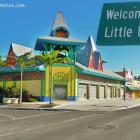ADVERTISEMENT
Konpa - Haiti Music Video
Konpa, Haiti Music Video. Read the following articles about Konpa
Kompa - Haiti Music
Kompa is a genre of music and a dance whose origin is from Haiti. It is usually written differently; compa or Konpa. The music has beats with tempo that is often rated as medium to fast. This kind of music genre is complex as it changes from time to time. It first came to be from a blending of European ballroom dancing and the Haiti culture.
This specific music genre arose in the early 20th century as a result of other genres like salsa and calypso among many others. The style referred to as Kompa direct was invented by a group of famous artists, however with its increasing fame it changed to the Zouk. Unfortunately the group split up and one of them improvised the above mentioned style once again. The two genres can be confused; however the Zouk has a slower tempo than the latter.
Latest from Djakout Mizik
Djakout Mizik is a popular Haitian Compas band. On New year's eve on MTV in 2007, they performed with Wyclef Jean. This was their first appearance on an American network television. In February 2008, they were crowned the best carnival band in Haiti for their energetic performance of Kalòt Marasa (two slaps).
In May 2006, members of Djakout Mizik were shot at while getting out of a van. Thankfully, none of the members were hurt and they had one of their most successful hit about this incident, Eskive.
Bandi Legal Sweet Micky
Michel Martelly, better known as "Sweet Micky", was born in Port-au-Prince, Haiti, on February 12, 1962. He grew up in the Port-Au-Prince suburb of Carrefour with his brother and four sisters. Micky, Best known for/as: Compas music's most colorful superstar, credits veteran Compas bands, Skah Shah, Frere Dejean, Tabou Combo and Cesaria Evora, a singer from the Cape Verde Islands as being influential on his music.
Micky first began performing as a one man band in 1988 in the Casinoes in Haiti. He released his first hit "Ou La La" in 1988. Two years later Micky expanded the band to include a bass player and a percussionist and by the release of the album "I Don't Care" in 1994 Sweet Micky was a household name in Haitian communities at home and abroad.

 DJAKOUT Number 1 - HABITUDE music video
DJAKOUT Number 1 - HABITUDE music video Mayor of Montreal Denis Coderre with Tropicana D'Haiti
Mayor of Montreal Denis Coderre with Tropicana D'Haiti STEEVE KHE - I Don't Know Much Music video
STEEVE KHE - I Don't Know Much Music video T-VICE - Moving On music video!
T-VICE - Moving On music video!  Tantan feat Alan Cave - Pa Pale Pawol Sa
Tantan feat Alan Cave - Pa Pale Pawol Sa  Disip - Heartbreak and Misery
Disip - Heartbreak and Misery  Klass - I am Sorry - Music video
Klass - I am Sorry - Music video TABOU COMBO Live au ZENITH
TABOU COMBO Live au ZENITH
 Big Night in little Haiti Welcomes System Band this Friday -...
Big Night in little Haiti Welcomes System Band this Friday -...  Alan
Alan